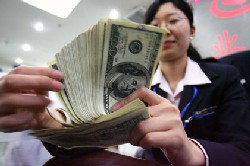China's foreign exchange reserves hit a new high of $ 2.85 trillion in 2010 but the 18.7 per cent increase over last year sparked concerns about the country's already excessive liquidity which was blamed for high level inflation in the country. Compared with nearly $ 2.65 trillion in September last, the reserves went up by $ 199 billion in the fourth quarter, marking the fastest growth on a quarterly basis in 2010, according to a statement from the People's Bank of China.
Compared with nearly $ 2.65 trillion in September last, the reserves went up by $ 199 billion in the fourth quarter, marking the fastest growth on a quarterly basis in 2010, according to a statement from the People's Bank of China.
The growth is spurred by Yuan appreciation, expectation of further interest rate hikes and monetary-easing policy in the US, analysts said.
Yi Gang, vice-governor of the central bank and head of the State Administration of Foreign Exchange (SAFE), said in an article in China Forex magazine that China will increase the flexibility of its currency exchange rate this year to reduce the trade surplus and inflationary pressures caused by ample liquidity.
As the Yuan's value rises, the reduced trade surplus and possible lower inflows of speculative capital from overseas would help ease the problems caused by excess liquidity, that ranges from inflation to asset bubbles, analysts said.
Wang Tao, head of China economic research at UBS Securities, said in a research note that the central bank is facing the challenge of persistent large foreign reserves accumulation.
Tao said she expected further net issuance of central bank bills and more hikes to banks' reserve requirement ratios in 2011.
China has been facing the problem of excessive liquidity since the government instigated stimulus measures worth USD 586 billion in late 2008 to tide over global economic crisis and adopted its "moderately loose" monetary policy to heat up an economy.
As for prices in the country, Inflation, that has already hit 5.1 per cent, has become more apparent in 2010 as a result of the expansion of lending in previous years.
In 2010, new Yuan loans reached 7.95 trillion yuan (USD 1.2 trillion), exceeding the government's target of 7.5 trillion yuan.
As China's import growth outpaced that of exports, its trade surplus in December was USD 13.1 billion, an eight-month low, while foreign exchange reserves increased by USD 16.4 billion over the period.
As far as economic growth is concerned, most institutions have predicted that domestic GDP growth will remain above 8 percent in 2011, and the yuan will appreciate at a pace between 3 and 5 percent, which may further attract foreign capital inflows.











 © 2025
© 2025